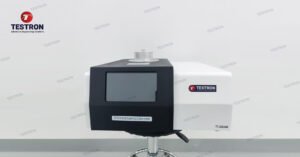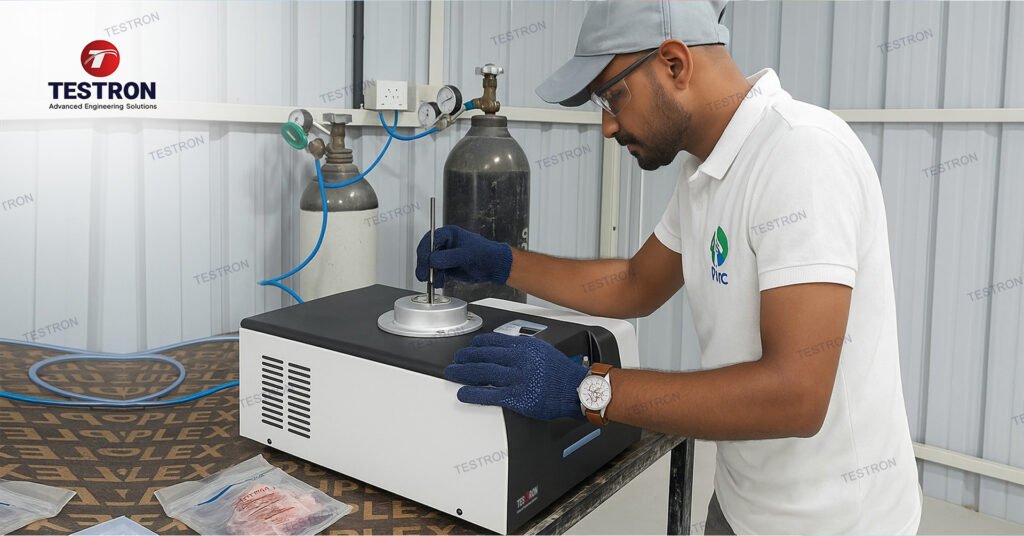The Challenge: Precision Thermal Analysis for Polymers and Pipes Using a Differential Scanning Calorimeter
In the fast-evolving plastics industry, thermal behavior analysis is critical. United Plastic Manufacturing Company LLC, a key player in Oman’s polymer sector, needed a differential scanning calorimeter (DSC) solution to analyze:
- Oxidation Induction Time (OIT)
- Melting and crystallization behavior
- Polymer stability and degradation
- Glass transition temperature for different batches
Before deploying advanced DSC equipment, their internal QA team relied on outsourced testing—a process that delayed reporting cycles and made process optimization slow and reactive.
The need was clear: in house, real time, highly sensitive DSC analysis, tailored to polymers and HDPE based pipe applications.
The Solution: TT-DSC600 Differential Scanning Calorimeter

United Plastic chose Testron’s TT-DSC600, a fully automatic, high resolution differential scanning calorimeter built for reliability, repeatability, and intuitive control.
Unlike many differential scanning calorimetry machines on the market, the TT DSC600 blends advanced computing, dual sensor design, and digital gas flow control into a compact unit designed for industrial users.
Why TT-DSC600 Differential Scanning Calorimeter was a Perfect Fit
Feature | Benefit for United Plastic |
| Wide temperature range (RT to 500°C) | Covered all standard polymer and pipe grade thermoplastic testing |
| ISO 11357 compliance | Matched global test standards for OIT and polymer analysis |
| Dual temperature sensors | Provided superior data accuracy and repeatability |
| One click software control | Reduced test setup time and operator training |
| DSC sensitivity of 0.1 mW | Detected even subtle thermal events in advanced polymer blends |
| Integrated industrial PC | Made remote access and report generation seamless |
The Impact: Data-Driven Production and Faster Market Response
Within two months of installation, United Plastic reported:
KPI | Before TT-DSC600 | After TT-DSC600 |
| OIT test result time | 3–4 days (outsourced) | 45 minutes (in house) |
| Batch to batch variation analysis | Manual tracking | Real time trend graphs |
| Testing cost | $800/month average | Fully absorbed in <4 months ROI |
| Material rejection rate | 8% | 2.5% |
This transition wasn’t just about owning a differential scanning calorimetry instrument—it was about owning the process. The in house system now flags poor raw material batches before they enter extrusion, helping prevent product failures downstream.
What Sets TT-DSC600 Apart?
There are plenty of differential scanning calorimetry equipment options out there, but the TT-DSC600 offers an ideal blend of performance, automation, and cost efficiency:
Technical Specs Snapshot:
Specification | Value |
| Temperature Range | RT to 500°C (extendable) |
| Heating Rate | 0.1–80°C/min |
| DSC Sensitivity | 0.1 mW |
| Resolution | 0.01 mW |
| Power | AC 220V, 50Hz |
| Compliance | ISO 11357, CE |
Why Industry Experts Are Turning to In-House Differential Scanning Calorimeter
Whether you’re manufacturing pipes, packaging films, textiles, or high-performance materials, accurate differential scanning calorimetry DSC analysis helps you:
- Optimize formulation and material selection
- Detect contamination or batch inconsistency
- Shorten product development cycles
- Ensure compliance with international standards
Modern businesses want to own their data. A differential calorimeter like the TT-DSC600 makes that possible.
Read more: High-Precision Differential Scanning Calorimeter in Canada
Voice of the Customer
“The TT-DSC600 changed how we look at quality. We’ve transitioned from reactive testing to proactive control—and that’s been a game changer.”
— QA Lead, United Plastic Manufacturing Company LLC
Trending Now: Why You Should Invest in DSC Testing
Predictive QA: With digital trend tracking, companies can act before failures happen.
Sustainability Edge: Optimize material use and reduce waste via early thermal profiling.
Faster Certifications: In house DSC testing supports faster documentation for audits and export compliance.
Related: Top Differential Scanning Calorimeter (DSC) Manufacturer in the USA
FAQs
A Differential Scanning Calorimeter ( DSC ) measures how a material’s heat capacity changes with temperature. It’s primarily used for analyzing melting points, crystallization, oxidation induction time ( OIT ), and glass transition temperatures of polymers, plastics, composites, pharmaceuticals, and more.
The TT-DSC600 offers dual temperature sensors for highly accurate results, ISO 11357 compliance, automatic gas flow switching, programmable interface, and an integrated industrial PC, making it a user friendly yet powerful tool for thermal analysis.
Differential Scanning Calorimeter price varies based on the configuration, add on features, and compliance requirements. The TT DSC600 is competitively priced to deliver high-end functionality and ROI for mid to large sized labs. For the best quote, inquire here.
Industries like plastics, petrochemicals, textiles, food science, metallurgy, pharmaceuticals, and packaging heavily rely on DSC scanning calorimetry for quality control, R&D, and regulatory compliance.
DSC testing provides precise thermal data that helps identify material inconsistencies, improve formulations, and optimize processing conditions. This minimizes defects, enhances durability, and ensures batch consistency.


